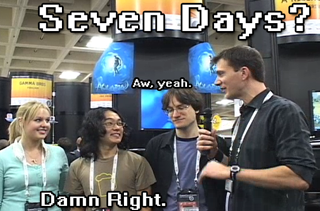the 3 of 2007
It seems I’ll be busy tomorrow so the likelyhood of me completing some game and adding it to this list before next year is slim enough that I dare compile the most interesting games of 2007 right now. If I were simply to try and pick the best games this list would be much harder to write since there are so many to choose from; rather it is a list of games I personally deem important.
The Darkness, while it might not rank among the top games of 2007 on other lists, at least it made some waves in june when it was released. And as the first commercially released game I was part of, I guess it will always be special to me… If nothing else, I have played it a lot more than any other game this year.
Bioshock, just because it made me realize that there was no point in bitching about the infantile level of narrative in games – it was actually my own fault for playing the wrong games.
Aquaria, yeah, I know I have mentioned this far too many times already. To be honest, I haven’t played enough recent 2D adventures to even say this with some confidence, but it seems to me Bit-Blot picked up a formula that hasn’t seen good use by the commercial games industry in 10 years or so. Where others made fan projects that were just slight extensions of the games we had back then, Aquaria dares to be different, dares to be bigger, while taking good care of it’s heritage. Time will tell if it has started something by this.
Legend of Zelda – Phantom Hourglass
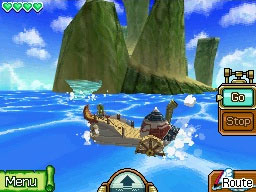
My view is that portable versions of major titles – or portable parts in major series, as in this case – are usually just watered-down versions of the real thing; as if it wasn’t possible to actually make a good portable game to begin with. Luckily, Nintendo’s major series have managed to avoid this fate more often than they have succumbed to it, but there are some bad examples out there as well. I’m not sure about Phantom Hourglass, as it seems a lot like a watered-down (no pun intended) version of Wind Waker, but if any Zelda game could actually maintain some substance with a lot less content, that would be it.
Phantom Hourglass doesn’t bring anything new to the table in terms of narrative and we are served a variation of the collect-somethings-to-enter-the-evil-something – story present in every Zelda game since games had in-game stories. The fact that it doesn’t really offer anything on top of this makes it rank in the lower end of the zelda-narrative-spectrum as far as I’m concerned, but that spectrum isn’t really wide so I guess it doesn’t matter. What matters slightly more is the presentation.
The DS isn’t made for fully 3D games, so it follows naturally that the game isn’t perfect in this regard. And it is by no means bad – what they have managed to achieve with the limited hardware is incredibly impressive and certain parts, for example the animations, are at least as good as it’s GameCube predecessor. Problem is, it’s not really enough and compared to the other games it’s poorly detailed and not very pretty at all. Which is a shame, really, since there has been several beautiful 2D Zeldas and Phantom Hourglass doesn’t need the third dimension to work.
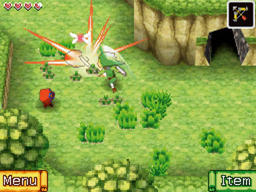
Continuing into the important part of the game – the design. Phantom Hourglass is conceptually a lot like Wind Waker with the open water and scattered islands, but the perspective and gameplay while on land is more akin to Minish Cap or any other of the 2D Zeldas; played almost exclusively from a top-down view. As stated, the levels are a little more scarce and less interesting than previous games, but still fun to play.
The big change, and seemingly where the bulk of the design time was spent, is in the implementation of the DS-specific controls. You play the game almost exclusively with the DS stylus, from walking and fighting to navigating. Normal commands suffer some precision but the difficulty has been adjusted for this so it’s not really noticeable; what’s more interesting is how the special items are implemented. You can control the boomerang’s exact path, aim in any direction when shooting arrows or sling the hookshot around poles; even the previously superfluous bombchus have an important part in Phantom Hourglass – for once, you really use your entire arsenal regularly. Sadly, the other DS functions – specifically the microphone – aren’t implemented with the same finesse – why would an entire development team think that it would be okay to release a game for a handheld that requires you to shout into the mic on several occasions? even the early DS games offered you a “silent” version.
So is it good enough? it certainly isn’t a bad game, and I have to admit that after this autumn my standards have risen considerably so I might be unreasonably harsh. Phantom Hourglass is well worth playing if you don’t mind taking on epic adventures on portable devices. It’s just that Nintendo has been doing so well with their core franchises lately, and held to the high standards set by the most recent Mario and Zelda titles Phantom Hourglass doesn’t really cut it.
Post-Aquaria; my life is empty now
I don’t really want to write more about Aquaria … No, in fact I do, I just really want to write why I don’t want to write more about Aquaria. I still really love the game but trying to get my fix on forums after I had found everything the game had to offer, my fears that indie fanboys are just as bad – if not worse – than console fanboys were confirmed. It would be bearable if they just fiercely defended the game(s) against any suggestions that they might not be perfect in every single way, but what really bothers me (probably because it’s personal) is that they, in their fanboyism, declare the “others”, in this case mainstream games, infinitely inferior in every way. I figured indie games were only about making games – and in a larger scheme, gaming itself – better, and that people with such a motivation would be above it all.
That is just a minor issue though, and doesn’t really have anything to do with me not having written anything for a couple of weeks. In fact, even though I was kinda sad when Aquaria ended that probably isn’t it either – I’m not sure there is even a good reason for it. Why would I need a good reason not to write anything for a couple of weeks anyway?
I have a vague feeling that my attention has shifted during the last 6 months, from my work to… I don’t know to what, actually. I would figure it had shifted to something since I don’t really feel like I have spare time, but I can’t really pinpoint what I’ve been up to. At Gotland Game Awards, Mirjam told me to take a step back every once in a while and consider what the “plan” was, and this feeling of loosing track of things makes me see the practical values of this in addition to the obvious calming effect knowing where you’re going has on a person.
Aquaria
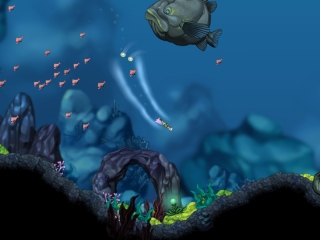
I have stated my anticipation of this title before,and I can now, somewhat relieved, say that I was not disappointed. Aquaria is indeed a very polished game that isn’t afraid to develop old concepts together with new ones, and a game that uses modern technology to show that there’s still life in the 2D action-adventure genre. Or maybe I’m just being nerdy and nostalgic, you be the judge.
The game focuses on the girl Naija, a mermaid (sort of) living in the underwater world Aquaria. One day she encounters a strange shadow and reaches a new level of self-awareness, leading her to start a quest to find out where she came from and why she is alone. The story is quite simple and slightly uneven at times, but then again the entire game gives a vibe more akin to a fairytale than a more adult story.
Aquaria is inspired by the Metroid and Castlevania games, and there is a great familiarity in exploring the waters. Even so, the fact that the game takes place underwater makes it very different – environments are less cramped and you never have any traditional platforming action like jumping over pits. The game seemingly makes up for this by having an immense amount of secrets, and is thus a more ‘pure’ exploration game than it’s inspiration.
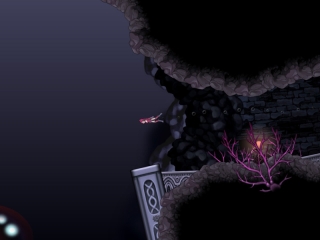
There are several modes of control but I only tried the default mouse-only style with the occasional finger on the keyboard for quick menu access. Basically you swim by pointing a direction away from Naija and clicking, interact by swimming up to objects and right-clicking and perform special functions by clicking on icons on-screen. Some people have reported problems with the intense amount of clicking involved (no autofire), but I found this setup perfect – like in the Suikoden games, you can play with one hand and don’t have to take breaks to eat.
Aquaria is a rather varied, but still very balanced game. While there are a little too many nearly-identical power-ups the developers have reached a good balance of not making them too powerful (necessary) or too weak (pointless). Levels have a distinctively different layout and every boss provides a unique and interesting fight.
My biggest problem with Aquaria is based on the fact that it’s very open and you very seldom get any clear indication of where it would be a good idea to go next. I understand that they wanted to let you explore what you found interesting in your own pace, but sometimes solutions are really unintuitive and this meshes very badly with not being certain that you’re supposed to be there in the first place. I clocked at ~20 hours when I beat it, but I would guess that 6-7 of those hours weren’t really progress, just me searching every corner of the map to find out where to go next. A simple, optional “hint”- system would’ve solved this for those of us with some limitations on our game time.
All in all, though, Aquaria was everything I hoped it would be and I am anxious to see what bit-blot will make next.
Distant Worlds and Out-of-touch people
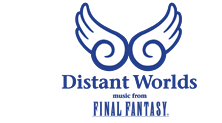
… So I took the evening off to go se the World Premiere of Distant Worlds – Music from Final Fantasy in Stockholm. Sad part of it was that I somehow managed to get sick and had to leave the concert hall on two occasions (once before the break, once after), and my focus while in there was more in the lines of repeating the mantra “do not feel ill, illness is the mind-killer” than enjoying the experience to the fullest. I did manage to listen through everything though – even paying attention during my favourite parts, and friends that were feeling better (and have a more informed taste in music) confirm my vague memory that the concert was indeed good. Then I come home and get this absolutely brilliant article sent to me.
I am pretty sure Gunilla is just deliberately trying to piss gamers off. I mean, the von Oben-“these darn kids and their videogamings should learn to appreciate real music instead”- attitude is more or less a given (though it’s getting really stale), but when others stop there, she carries on. Headlining the article with “Game addiction births philharmonics” and trying to send Nobuo Uematsu on a guilt trip for making music for violent videogames is just classic, like her only knowledge of videogames comes from headlines in the “family” section of the evening press (for the uninformed, Final Fantasy is violent in much the same way as chess; it has a highly abstract, turn-based representation physical combat). To top it off, she acknowledges interviewing one of the most influental composers in game music but doesn’t have the courtesy to actually find out anything about what he’s actually done to deserve that status. I really don’t think Gunilla is that stupid, and taken like sarcasm it’s actually very funny.
On another note, while I certainly like some of the tracks from the Final Fantasy soundtracks, it is quickly becoming the pop music of live orchestra- videogame music performances (that sounds far more niche than it actually is). Everybody does it, and they even used the same general tracklist. I almost think I would’ve left during the “One-Winged Angel” encore even if my health issues hadn’t already compelled me to do so. In fact, I probably wouldn’t have gone at all if it hadn’t been an excellent occasion to hang out with some friends that I don’t see often enough.
Which is kind of why the aforementioned critics are partly right, I guess. The main reason most people go to these concerts is because they recognize the source material, and while they may well like the music a lot, they’re fond of the particular tunes and not the general style – music from a game they hadn’t played would be just as uninteresting as anything else the orchestra traditionally plays.
IGF 2008 Finalists announced
http://www.igf.com/02finalists.html
Notable entries (that is, games that I’ve heard a lot about before) are World of Goo and Crayon Physics Deluxe. I played most of the nominated games of 2006, but there were a lot fewer games with playable demos in 2007 and now it seems there are almost none. In a way I guess it’s nice that independent games get bigger and more serious, but it’s sad that it isn’t possible to get a real impression of your own anymore.
Activision and Blizzard merge?
“Activision and Blizzard have said they will form “the world’s most profitable games business” in a deal worth $18.8bn (£9.15bn).“
Interesting, to say the least. Activision surpassed EA as top third-party publisher this summer, and Blizzard … well, they’re Blizzard. I would guess this is to the rest of the world what the Squaresoft – Enix merger was to Japan a few years back.
Aquaria release imminent
… This autumn, and November in particular, has been a really intensive month as far as games go – A lot of high-profile games have been released. It isn’t too far-fetched to speculate that this just might have been the most eventful month(s) in gaming history (at least as far as releases go), but I have to question if this really matters – usually, lack of time (or in my earlier years – money) prevents me from playing good games, not lack of titles to play. Even so, I won’t deny that I have been looking forward to many games coming out this autumn.
It seems strange then, given that I own all of the major consoles and a rather sweet audiovisual setup, that the news that excite me the most is about Aquaria being released. A 2D independent game with most development work done by two people seems like an odd thing to be excited about when some of the best, most hi-tech and most meticulously designed games of this generation are being released. Apart from the IGF award and the fact that I liked the freeware games Derek had been a part of, I have very little guarantee that it will actually be a good game.
Maybe I just have unhealthy amounts of nostalgia, but that’s not all of it. I have always maintained that 2D means more than rendering; it provides an overview that is virtually impossible to get in 3D and allows for gameplay variants that can never be achieved in 3D. What I am saying is that with today’s technology, we could evolve the 2D-games in ways that weren’t possible 10-15 years ago, and aren’t possible with 3D games.
I of course have no guarantee that Aquaria will actually try to do this, but chances are it will bring something to the table. I’ll see in a week.
